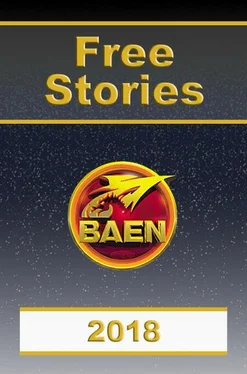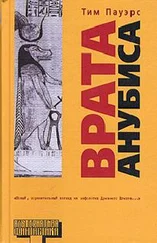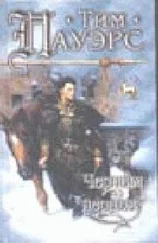U-818. U-818. U-818. Lachs .
Calling for them out of nowhere. U-818, Lachs. U-boats were frequently called by the names of their commanders. But how could they possibly respond? There was no secured traffic on this frequency, and the call was in the clear, so there was no sense in encoding a response.
They were still within the twenty-meter band, yes, but that covered a lot of territory, and they’d left all of that confusing traffic—the contact frequency—well behind them. The code-stream offered no additional information, no explanation for the call. Was this a trap?
If it was a trap, wouldn’t the enemy have taken care to conform more closely to a signal they would have responded to without thinking twice about it, suspecting nothing?
Straightening up Lachs turned his back to the doorway with his hands flattened to either side of his head, thinking. The ZweiVo and Ellie were both here, but they did not speak Morse code as Lachs and Zoller—and Goond Hols, for that matter—did. They wouldn’t know that U-818 was being hailed.
Lachs was not a reckless man, but he had the capacity for swift decision within reasonable parameters. And he knew how to take risks. Their situation defied all logic. They had to find some explanation.
Every man on this boat knew that things were not going according to plan: they were not returning to their base at Hammerfest. They were not traveling to intercept a convoy; they were making enough speed—on the surface, since it was dark night—to recharge the batteries; and apart from that there was no information shared because nobody had any. Everybody knew by now that the water was fresh and the Moon was full. He owed it to the crew to seek out a solution. It was time to take a chance.
He nodded to Zoller. “U-818,” he said. “Reply.” He was afraid that everyone within earshot was to be robbed of the sudden hope he could see in the expressions of his subordinate officers, because he had not taken time to lay out a rationale for his actions and they would not know what he and Zoller knew. He wished he had Goond beside him, because Goond could read Morse code as well as he did; but Goond was in the control room, and Lachs didn’t care to send for him, because it would create more strain in what was for now a calm if perplexed boat. He shook his head at Sclavie and Vilsohn. Sorry. Nothing to report. Stand by .
Zoller keyed the response. U-818 Lachs, U-818 Lachs, U-818 Lachs. Calling station identify . That would be innocuous enough, perhaps, if someone heard: standard format, someone calling themselves U-818 Lachs responding to someone not transmitting according to customary practice.
But there was silence. Were there technicians being placed on alert in some Allied operations room, retransmitting messages to listening stations, alerting remote observers to relay the information that would let them triangulate on U-818’s position and send bombers? Destroyers?
If that were so, would U-818 not at least find out where they were? Or did the enemy have as little knowledge of where U-818 had gone as they themselves did?
The code came back at a much slower speed, hesitant, surprised. Or perhaps playing for time. Zoller reached out for the controls of his locator apparatus, with a questioning glance. Lachs nodded emphatically. Two could play the game.
U-818. Okay. Who’s the joker? Lachs .
In English: another piece of potential evidence. Surely the Allies would have a German speaker to lure a German boat. The calling station was calling himself Lachs, then, not calling for U-818 Lachs by name. It was a point of clarification. “Ask him for German,” Lachs said, turning back to lean up again half-in, half-out of the radio room so that he could better hear the muted sound from Zoller’s headpiece. “No, but wait—” Lachs held out a warning hand as Zoller reached for his Morse set. He had to say something to his officers, even if it could not make very much sense.
“We have a radio contact. They ask for us, but in English. I don’t know if they’re enemy. I’m going to risk it.” More later . Dropping his hand away Lachs nodded to Zoller, whose hand betrayed a certain degree of hesitancy on his own part; something Lachs knew because he knew Zoller’s touch on the Morse transmitter key, something only two other people on board—Goond and Bentzien—and certainly no outside contact, was likely to be able to interpret, except by instinct. Lachs did not discount the instinct of a telegrapher. He had just made his own assumptions, after all.
I ask who is the joker . The calling station’s German was hesitant; German was not his first language, apparently. The German that the Allied propaganda stations spoke on their broadcasts was indistinguishable from that of a native speaker, right down to the reproduction of a recognizable dialect—because they were native speakers, though they were working with the enemy. If the calling station was an Allied double agent his German should be better. Name and call sign please .
You first , Lachs thought. But rudeness raised barriers to communication, and he wanted information out of whomever he was talking to. The calling station already apparently believed he was not in earnest: so Lachs decided to try an honest answer.
“This is U-818,” he said slowly, so that Zoller could keep up on the Morse key. “Believe me or not. My name is Verricht Lachs. And you?”
His officers reacted with predictable unease, but Lachs felt confident of their trust in him. Not as if any of them had much choice on the issue of trust. It was also a matter of military protocol, whether or not they had established a strong relationship over the course of so many shared war cruises. He and Goond went even further back.
U-818. Get real. If you’re U-818 you went down with all hands on the tenth of February. 1945. Lachs .
Zoller started in his seat, but kept his station. Lachs stared at the floor to process this information. Of course U-818 had gone down in February of 1945. And with all hands. But they’d come up again. The Allies could easily have deduced their identity; there were spies in Hammerfest as at every U-boat base, and the security of their transmissions to and from Headquarters were consistently being compromised for all the care in the world that they could take.
The calling station owed him information. Lachs waited. Here it came. And Verricht Lachs was my father. A break; and then in English, come on. Share the joke. George. It’s you, isn’t it ? And then, as an afterthought, the customary declaration of call sign, this time with a name attached. This is Charlie. Lachs .
Then he was not Lachs’ son. Lachs’ son was named Pieter, Rudolph Zimmer Mattias Ulrich Pieter Lachs. Five years old. Lachs made it a practice to think seldom of his family while he was on war cruise, because there was no sense in dwelling on the fact that he might never see his wife and child again. During the dark hours past—not knowing whether they would return, this time—he had sent a silent parting prayer to God for them, but the circumstances had been exceptional.
Before he had time to puzzle out what he should say next he heard a new signal, weaker, English; not me, Charlie, what’s up? Just bringing the DPK repeater back up . WVREF George . It was slightly off frequency, then, but Zoller didn’t try to adjust, concentrating on his task. Acquiring a fix. Locating the original signal. The original caller had not moved off frequency to match.
Eh, somebody out there having a go at me, that’s all. I make the station out as offshore. Middle of Lake Superior somewhere, as if. Someone out on a boat, maybe.
Читать дальше








![Тим Пауэрс - Последние дни. Том 2 [litres]](/books/393813/tim-pauers-poslednie-dni-tom-2-litres-thumb.webp)
![Тим Пауэрс - Последние дни. Том 1 [litres]](/books/394090/tim-pauers-poslednie-dni-tom-1-litres-thumb.webp)
![Тим Пауэрс - Последний выдох [litres]](/books/402145/tim-pauers-poslednij-vydoh-litres-thumb.webp)